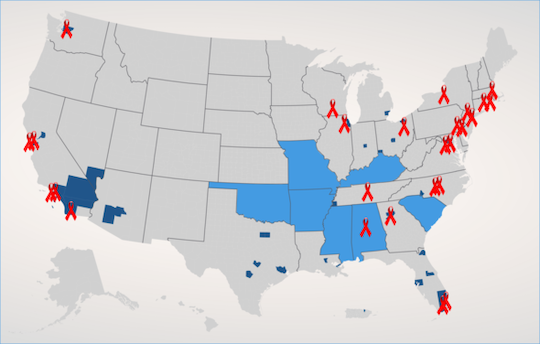NIH bolsters funding for HIV implementation research in high-burden U.S. areas
From HIV.gov…
The National Institutes of Health has awarded approximately $11.3 million to 23 institutions across the United States to collaborate with community partners to develop locally relevant plans for diagnosing, treating and preventing HIV in areas with high rates of new HIV cases.
 The awards will help enhance the implementation science knowledge base needed for the proposed Ending the HIV Epidemic: A Plan for America. The plan aims to leverage the powerful data and tools now available to reduce new HIV diagnoses in the United States by 75 percent in five years and by 90 percent by 2030. President Donald J. Trump announced this bold new initiative during the State of the Union Address in February. If funds are appropriated by Congress, the 10-year initiative will begin in fiscal year 2020. The awards announced today are one-year awards to support pilot and formative studies to prepare for more extensive implementation science research proposals expected in 2020.
The awards will help enhance the implementation science knowledge base needed for the proposed Ending the HIV Epidemic: A Plan for America. The plan aims to leverage the powerful data and tools now available to reduce new HIV diagnoses in the United States by 75 percent in five years and by 90 percent by 2030. President Donald J. Trump announced this bold new initiative during the State of the Union Address in February. If funds are appropriated by Congress, the 10-year initiative will begin in fiscal year 2020. The awards announced today are one-year awards to support pilot and formative studies to prepare for more extensive implementation science research proposals expected in 2020.
“With existing, powerful HIV treatment and prevention tools, we can end the epidemic in the United States,” said Anthony S. Fauci, M.D., director of the National Institute of Allergy and Infectious Diseases (NIAID) at NIH. “The new initiative is a practical, achievable implementation plan. By working directly with health departments and other community organizations, researchers can find the best ways to use the highly effective methods at our disposal to diagnose, prevent and treat HIV in the United States.”